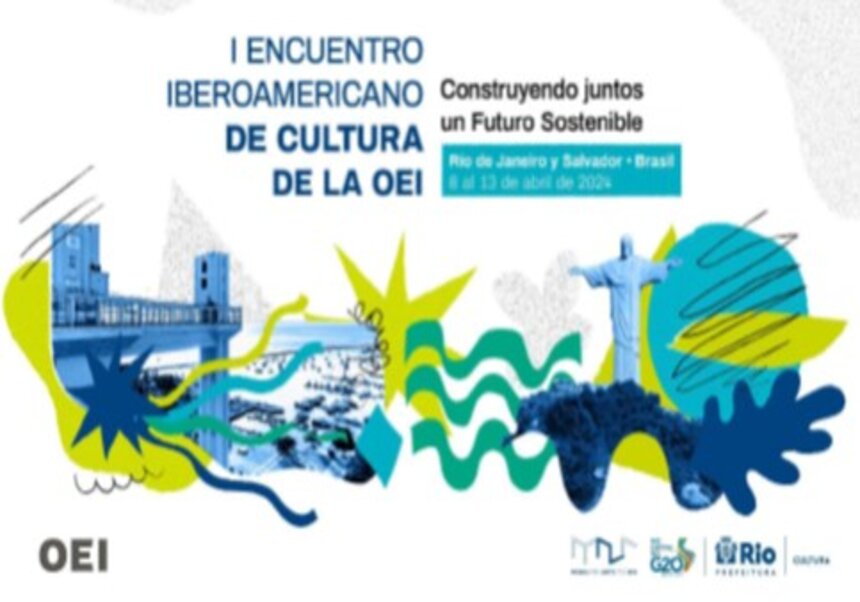
The week of 8 to 13 April the I Ibero-American Meeting of Culture of the OEI will be held in the cities of Rio de Janeiro and Bahia in Brazil.
I IBERO-AMERICAN MEETING OF CULTURE OF THE OEI:
Building a Sustainable Future Together
Culture is the essential element of human life that links us to our past, present and future. It is a living resource with enormous power to promote social transformations, to adapt to changing contexts and crises that call us to permanently reflect on our capacity and creativity. Culture is also an incentive to seek new forms of coexistence and a valuable resource to take on the new challenges that our realities confront us every day. The Ibero-American region has been a driving force in promoting political dialogue on the role of culture for sustainable development, a dialogue that has been facilitated and promoted thanks to the sharing of two intercomprehensible languages, Spanish and Portuguese, without losing sight of the profound linguistic diversity present in the region. Diplomacy and cultural cooperation, through an exercise of collaboration and shared work on culture, the arts, cultural heritage and languages, is a powerful tool for social projection. Along these lines, the Ibero-American Cultural Charter (ICC), approved by the Ibero-American Heads of State and Government in 2006, constitutes and provides a framework for action that encourages cultural cooperation between Ibero-American countries and offers mechanisms for the protection and promotion of culture and the rich and diverse shared cultural heritage. In this way, it is essential to strengthen the role of Ibero-American cultural policies and collaborative projects, emphasising a partnership with cultural networks and sectors linked to the territory that facilitate the promotion of cultural rights to reinforce the value of cultural and linguistic diversity, strengthening intercultural dialogue and advancing towards a global cultural citizenship. Numerous studies highlight the importance and value of culture for its central role in economic regeneration, as well as a means and essential tool in this process and for its contribution to social cohesion, the strengthening of community ties, the promotion of cultural diversity, the reinforcement of feelings of identity, and as a contribution to sustainable economic development (WB, UNESCO 2020, OEI Culture and Development Report, OEI-ECLAC Report).
Objectives of the meeting:
- To share initiatives, mechanisms and experiences that highlight the value and importance of Ibero-American culture and its contribution to sustainable development, through the presentation of existing good practices in the region, as well as impact programmes and projects based on the Ibero-American experience.
- Promote regional collaboration to overcome the common difficulties and challenges of Ibero-American citizenship from a cross-cutting approach and with the recognition of cultural diversity.
- To gather the contribution of experts who contribute to identify opportunities for collaboration between governments, cultural entities, the private sector, international organisations, cooperation networks and other relevant actors to strengthen the cultural and creative ecosystem in the region from a rights-based approach.
- Facilitate spaces for the generation of knowledge that foster the exchange of experiences and good practices in cooperation and development of cultural initiatives in Ibero-America.
In this context, Pau Rausell will explain some of the recent research carried out by the Econcult group, such as the results of the MESOC project. Specifically, he will participate on Tuesday 9 April in a round table at the Rio Art Museum. In this space for dialogue he seeks to address the following questions:
How to strengthen and support strategies aimed at ensuring the sustainability of cultural infrastructures and cultural policy initiatives? How to strengthen regional cooperation to understand the social, economic and environmental impacts of CCIs, generating reliable, comparable and timely data and statistics? How to strengthen the contribution of CCIs to the promotion of decent work in a sustainable way? How CCIs can contribute to cultural diversity and environmental protection? How to work on the relationships between public and private entities in strengthening CCIs?
The participants in the round table are:
- - Eduardo Saron, Presidente de la Fundación Itaú (BRA)
- - Luciano Dias Monteiro, Director Global de Comunicación y Sostenibilidad de Santillana (BRA)
- - Maria Marighella, Presidenta de la Fundación Nacional de Artes de Brasil (FUNARTE) (BRA)
- - Pau Rausell, Director del Área de Investigación en Economía de la Cultura y Turismo (Econcult), Universitat de València. (ESP)
- - Raphael Callou, Director General de Cultura de la OEI (BRA)
Moderadora: Cristina Calleja, OEI (ESP)









